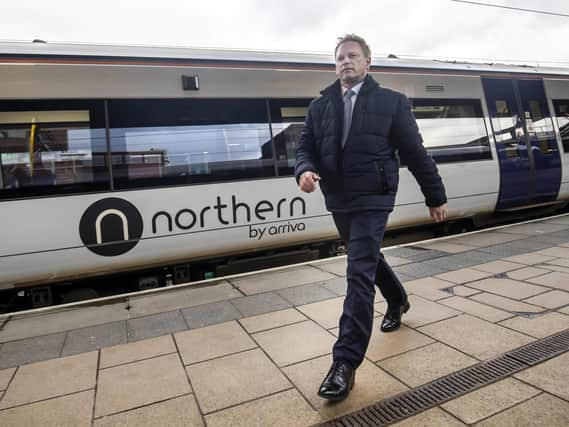Let’s not repeat past mistakes in bonfire of the rail franchises – David Behrens


But is that to be the consequence of the Government’s bonfire of the train franchises this week? The “new deal” promised by the Transport Secretary, Grant Shapps, certainly raised more questions about the future of rail travel than it answered.
It was, of course, attractively packaged. Ministerial announcements always are. Payments would be denied to operators who failed to perform, Mr Shapps said, acknowledging that the opposite had been true in the past. But the devil of the new arrangements will be in the detail, and he gave no hint as to what they might be. Will this be a return to nationalisation or not?
Advertisement
Hide AdAdvertisement
Hide AdIt was the fine detail of the previous attempt at privatisation in 1993 that the civil servants who now report to him got so disastrously wrong. Therein lay the roots of a litany of failure and misery that has defined our passenger services ever since. So before they pronounce on what will come next, it is worth reminding ourselves – and them – of the lessons for this time around.


Privatisation had been one of the pillars of Margaret Thatcher’s emancipation of the middle classes, and the earlier sell-offs of British Gas and British Telecom had created an expectation of easy money for those prepared to speculate. But those were profitable, going concerns; the railways were going nowhere and losing money hand over fist. Their sale empowered all the wrong people.
Railtrack, the private company created to maintain the lines and signals, was the first casualty. It had been intended as a bandwagon for small investors but many of them fell off and lost their shirts as it collapsed amid spiralling costs and two dreadful rail crashes that claimed 38 lives. So much for putting profit before people.
Advertisement
Hide AdAdvertisement
Hide AdThe real rewards were in the trains themselves. Most of British Rail’s fleet was handed to three “rolling stock companies” who, with little risk, leased them to the actual operators. Some of their managers made tens of millions when they sold out to investment funds a few years down the line. It is a model that was flawed from the start, yet it persists to this day, incentivising the use of clapped-out Pacer trains and other relics because replacing them would lower profits.
This inequity is at the heart of the imbalance between hard-pressed passengers and the fund managers who are effectively now the fat controllers. It is this which Mr Shapps must address if he is to make good on his promise to keep those parts of the private sector that have driven innovation, while shunting the rest into a siding.
He must also correct a second misplaced incentive; one which inflates cost at directly the expense of passengers. For years now, the train companies’ rank-and-file staff have clung to practices of overmanning as old as those BR cheese sandwiches, and have been rewarded for so doing.
Advertisement
Hide AdAdvertisement
Hide AdTheir selfishness was laid bare by the stoppages over “driver only operation” which crippled services in the North for the best part of two years but which in reality were little more than a demarcation dispute between rival unions. One of them, the RMT, rejected unprecedented assurances of jobs and pay rises for seven years because its members would not give up their exclusive right to open the carriage doors and thereby their ability to disrupt services when they needed leverage. The union claimed that safety was at risk, but the only tangible threat was to its own viability.
Reforming all of that will be as hard as cleaning up the civil service itself, but Mr Shapps has an unlikely ally as he seeks to redress the balance between traveller and train – the very pandemic that brought the service to its knees. Its legacy will be to strip away the complacency among operators who thought they could get away with almost anything because passengers would ultimately have to use the service whether they liked it or not, and if not they would lump it. That is no longer true for vast numbers of people and may not be again in our lifetime.
We will catch a train only when it suits us, and that introduces an element essential to any private industry but notably absent in 1993 – competition for business.
Support The Yorkshire Post and become a subscriber today.
Advertisement
Hide AdAdvertisement
Hide AdYour subscription will help us to continue to bring quality news to the people of Yorkshire. In return, you’ll see fewer ads on site, get free access to our app and receive exclusive members-only offers.
So, please – if you can – pay for our work. Just £5 per month is the starting point. If you think that which we are trying to achieve is worth more, you can pay us what you think we are worth. By doing so, you will be investing in something that is becoming increasingly rare. Independent journalism that cares less about right and left and more about right and wrong. Journalism you can trust.
Thank you
James Mitchinson
Comment Guidelines
National World encourages reader discussion on our stories. User feedback, insights and back-and-forth exchanges add a rich layer of context to reporting. Please review our Community Guidelines before commenting.